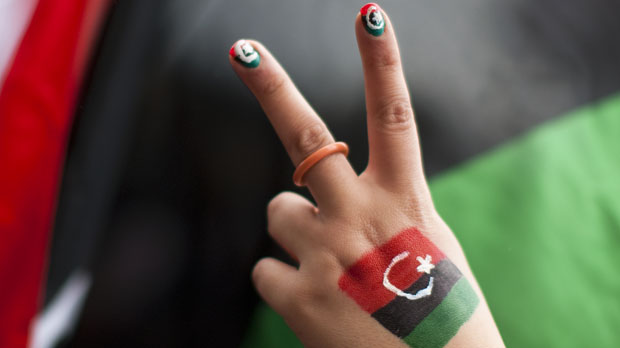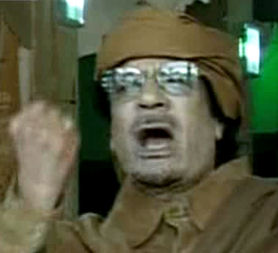‘The misery belts of Libya are leading the rebellion’
Libya’s revolt is an uprising of the poor, who “have nothing to thank Gaddafi for or stop them from aspiring for a change of rule”, writes Middle East expert Dr Larbi Sadiki for Channel 4 News.

Colonel Gaddafi‘s Libya cannot now escape the infectiousness of democratic revolutionary wind of change blowing from the west (Tunisia) and the east (Egypt). Three interrelated factors explain the cracks appearing in hegemonic state built by Gaddafi for over forty years: systemic, dynastic/tribal, and regional.
Channel 4 News special report – Arab revolt: Middle East uprisings
Gaddafi’s singularity
Only one thing spoils Leptis Magna (a Roman city, the ruins of which lie east of Tripoli) and the heritage of the legendary anti-Mussolini fighter of the Libyan desert, Omar Al-Mokhtar (a Libyan resistance leader of the 1920s): Gaddafi, the last of the great narcissist and autocratic Arab leaders.
I led one of the very few study visits to Libya in 2001. The 20-member group did not escape the watchful eye of the agents of the brother leader. In public, Libyans we met praised the system. In private they mercilessly vilified it. This is practically true of any encounter with Libyans not related to Gaddafi.
Even the colour green was hated by Libyans. The flag was green, the great revolution promised verdure; the green book committed to self-government; and green was the colour of the military school outfits visible almost everywhere.

This mono-chromatic vision Libya was filtered for over 40 years through a single mind-set, that of Gaddafi since execution of the successful 1969 coup that ousted the pro-British King, Idris.
So instead of a functional state, my Exeter University students and I discovered an institution-less securitate. Funds, marches, speech, news, cadres, slogans, all decided for the Libyan people.
An inner circle of Gaddafi’s confidants and close relatives decided and executed the hangings of the 1970s, relying on the fearsome and murderous revolutionary committees. The absence of laws made it easier for the revolutionary committees to commit crimes systematically.
LIVE BLOG: Gaddafi isolated, but son defiant amid more clashes
Dynastic and tribal politics
Libya’s republic of the masses has decayed. Following the 1993 coup blamed on the Wirfallah one-million-strong tribe, Gaddafi pursued a policy towards tribal realignment, eventually followed by dynastic politics.
Gaddafi claims to hold no official post. Yet his eldest son from his second wife, Saif al-Islam, has access to millions of dollars to fund his Gaddafi International Charity and Development Foundation (GICDF). His second eldest son al-Mutasim Billah is in charge of national security and most probably the man in charge of quashing the ongoing uprising. The former is the civilian/political heir apparent, the latter the military heir.
Gaddafi has had enough time to experiment with his failed revolution.
Daughter Aicha, a lawyer is in charge of the charity called Watasimou (Solidarity). Third son Sadi heads the country’s football federation, and his younger brother Hannibal appears to run nothing except expensive fast cars. Mutasim;s right arm is Khamis, who is in charge of special units. Again, these are forces that will be steadfast to the bitter end to save the dynasty Gaddafi and his sons have been constructing.
Read more – Who knows Saif Gaddafi?
The tribalisation of polity in the mid-1990s is now proving lethal against Gaddafi and his sons. The Wirfallah tribe have not forgotten humiliation, exclusion and the execution of members involved in the 1993 coup, such as Miftah Al-Wirfalli. This was the first tribe to denounce the Gaddafi regime a few days ago. Its members in the army would have not hesitated to disobey orders and join the uprising. This is an opportunity they have been waiting for since the mid-1990s.
Marginalisation in oil-rich Libya
Where did the oil wealth go to? Neither Tunisia nor Egypt had the enviable income from oil rent. Instead of having a per capita income on par with Qatar or Kuwait, Libya’s living standards for millions of citizens as well as cities are not better than that found in oil-poor Tunisia or Egypt.
Thus the misery belts of Libya are now leading the rebellion. The eastern region, i.e Benghazi has seen very little of petroleum money spent on it. Cities like Al-Bayda, Derna, Ijdadia fare not any better. They have nothing to thank Gaddafi for or stop them from aspiring for a change of rule. The same applies for the poor suburbs, Zintan and Zawiya, surrounding Tripoli.
De-revolution: the Libyan way
Gaddafi has had enough time to experiment with his failed revolution. Now the Libyan people are struggling to engender their own citizenship and sovereignty through their own revolution, people’s power as in neighbouring Tunisia and Libya.
It shall not be easy as the machines of death available to Gaddafi’s supporters are already being unleashed mercilessly against a people trying to rise up against a murderous tyrant. There will be a price; but there will also be delivery from tyranny.
Gaddafi has already committed political suicide by making the mistake of committing mass murder against his people in the age of Twitter and Facebook.
Islamist Sadiq Al-Ghiryani has from Tajura, in Tripoli, joined the rebellion. Gaddafi’s henchmen were able to detain Al-Ghiryani but determined Libyans fought them to free the religious leader earlier this week. There is a hidden narrative in the Libyan miasma about the west’s complicity in upholding the Gaddafi regime.
Gaddafi has already committed political suicide by making the mistake of committing mass murder against his people in the age of Twitter and Facebook. For a man so enamoured with his brilliance, he has obviously missed the lesson of the last two months in neighbouring Tunisia and Egypt. Information is no longer possessed by states.
Gaddafi’s eccentricity, however, may pay off. He is used to living in tents and may soon enough be pitching one in exile, if he survives the ongoing Libyan people’s revolt.